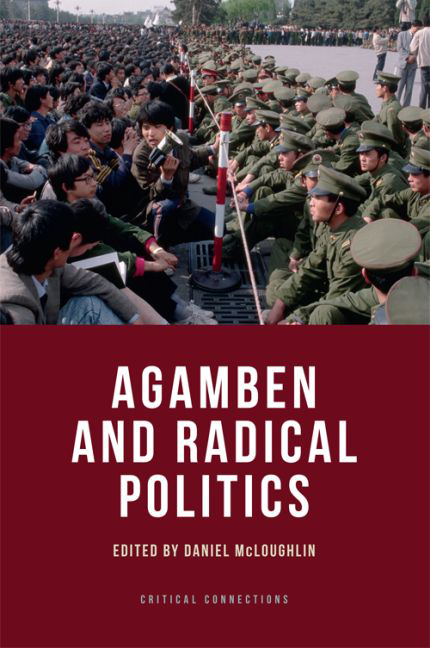Book contents
- Frontmatter
- Contents
- Acknowledgements
- Introduction: Agamben and Radical Politics
- 1 Capitalism as Religion
- 2 Glory, Spectacle and Inoperativity: Agamben's Praxis of Theoria
- 3 On Property and the Philosophy of Poverty: Agamben and Anarchism
- 4 ‘Man Produces Universally’: Praxis and Production in Agamben and Marx
- 5 Liturgical Labour: Agamben on the Post-Fordist Spectacle
- 6 An Alogical Space of Genetic Reintrication: Notes on an Element of Giorgio Agamben's Method
- 7 Zoē aiōniōs: Giorgio Agamben and the Critique of Katechontic Time
- 8 Agamben, Badiou and Affirmative Biopolitics
- 9 Form-of-Life and Antagonism: On Homo Sacer and Operaismo
- 10 What Is a Form-of-Life?: Giorgio Agamben and the Practice of Poverty
- 11 Law and Life beyond Incorporation: Agamben, Highest Poverty and the Papal Legal Revolution
- Notes on Contributors
- Index
7 - Zoē aiōniōs: Giorgio Agamben and the Critique of Katechontic Time
Published online by Cambridge University Press: 23 September 2017
- Frontmatter
- Contents
- Acknowledgements
- Introduction: Agamben and Radical Politics
- 1 Capitalism as Religion
- 2 Glory, Spectacle and Inoperativity: Agamben's Praxis of Theoria
- 3 On Property and the Philosophy of Poverty: Agamben and Anarchism
- 4 ‘Man Produces Universally’: Praxis and Production in Agamben and Marx
- 5 Liturgical Labour: Agamben on the Post-Fordist Spectacle
- 6 An Alogical Space of Genetic Reintrication: Notes on an Element of Giorgio Agamben's Method
- 7 Zoē aiōniōs: Giorgio Agamben and the Critique of Katechontic Time
- 8 Agamben, Badiou and Affirmative Biopolitics
- 9 Form-of-Life and Antagonism: On Homo Sacer and Operaismo
- 10 What Is a Form-of-Life?: Giorgio Agamben and the Practice of Poverty
- 11 Law and Life beyond Incorporation: Agamben, Highest Poverty and the Papal Legal Revolution
- Notes on Contributors
- Index
Summary
Only rarely has it been recalled that Erik Peterson's bracing critique of political theology was effectively carried out, not on one, but on two fronts. On the one hand, there was the well-known argument that with the proclamation of the orthodox dogma of the Trinity, early Christianity's brief flirtation with a political theology founded on the model of Hellenistic Judaism was brought to an abrupt and definitive end (for the reason that the triune God, unlike the ‘monarchical’ God of the Jews, had no analogue in the created world). On the other hand, however, there was the lesser-known, but no less significant, argument (and potentially even more devastating for its implicit target in Carl Schmitt) concerning the triumph of St Augustine's theology of peace over the prevailing interpretation of the Pax Romana as the fulfilment of the messianic prophecies of the Old Testament. According to this second perspective – which is treated only very briefly in the text, yet whose significance is underscored by the dedication to Augustine which graces the treatise's opening page – any peace, whether Roman or otherwise, which would be realised politically (and hence appear immanent to history) must necessarily be an illusion, because true, authentic peace is to be attained only at the end of time, only in eternity. The significance of the first of these claims for Giorgio Agamben's recent reconstruction of the paradigm of economic theology requires little comment. It is starting from Peterson's critique, to be sure, that he undertakes to rehabilitate Schmitt's concept, even while submitting it to a profound structural overhaul, by showing how the ante-Nicene Church Fathers responsible for the first articulation of the doctrine of the Trinity had in fact sought to reconcile the received theological-political notion of divine monarchy with the unprecedented elaboration of a divine economy. The significance of the second of these claims for Agamben's project, on the other hand, is anything but obvious. Yet it is only against the backdrop of this argument regarding Augustine's theology of peace with its eschatology of deferral, I want to suggest, that the precise sense of his intervention with respect to the debate between the theologian and the jurist becomes fully intelligible.
Agamben's appraisal of the debate in fact encompasses three distinct levels.
- Type
- Chapter
- Information
- Agamben and Radical Politics , pp. 141 - 164Publisher: Edinburgh University PressPrint publication year: 2016



